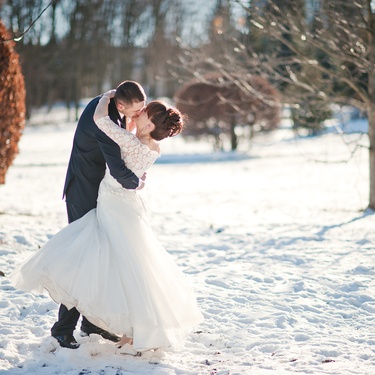
Most people get married in the summer and early fall. However, these busy seasons come with high costs, limited vendor availability, and other challenges many couples want to avoid. Winter is an attractive alternative that possibly offers you and your partner a more affordable, flexible wedding. If you’re interested in getting married in the winter, consider the pros and cons before committing.
The Pros
Why tie the knot in December through March?
Better Vendor Availability
For one, since winter falls in the off-season for weddings, many venues and vendors are more available and, often, more affordable. This flexibility makes it easier to secure your dream photographer, florist, or location without competing against peak-season couples.
Unique Atmosphere
Secondly, winter weddings stand out because of their cozy, romantic vibes. If you dream of elegance, winter provides the perfect setting. Seasonal touches like pine garlands or dramatic colors can make your big day highly memorable.
Fewer Weather Surprises
While it might seem counterintuitive, winter weather is more predictable than spring or summer weather. Though it depends on where you live, it will probably be cold, and you can count on that. From planning your outdoor bridal shower in the winter to getting things ready on the big day itself, the setup involves the same stuff: tents, heaters, and warm decor. In winter, you won’t plan for an uncovered outdoor wedding and just hope it doesn’t rain—you can prepare ahead of time and bring peace of mind to your guests.
The Cons
Winter is great for weddings in many ways but not so great in others. Here are the main drawbacks.
Weather Challenges
Cold weather can create some logistical challenges. Though you can adequately prepare your venue, snow, ice, or storms could make travel difficult for your guests, potentially creating delays or cancellations.
Limited Daylight
Winter’s shorter days mean less natural light for those picture-perfect moments. If you’re planning a late afternoon ceremony, you may miss the golden hour for photos. This might require flexibility in scheduling or investing in professional lighting for your event.
Holiday Conflicts
Planning a winter wedding near major holidays can result in scheduling conflicts. Some of your guests may already have plans or face higher travel costs. Additionally, holiday decorations at venues might clash with your vision, unless aligned with your theme.
Is a Winter Wedding Right for You?
As you consider the pros and cons of getting married in winter, remember your personal vision and priorities. If you want to avoid the busy season and have a more unique wedding, winter could be the best time for you. On the other hand, if you dream of a breezy outdoor venue and more guest availability, then summer or fall could be better. In the end, however, every wedding is unique, and your love story is what truly matters, no matter the time of year!
Bio: Casey is a passionate copyeditor highly motivated to provide compelling SEO content in the digital marketing space. Her expertise includes a vast range of industries from highly technical, consumer, and lifestyle-based, with an emphasis on attention to detail and readability.



















